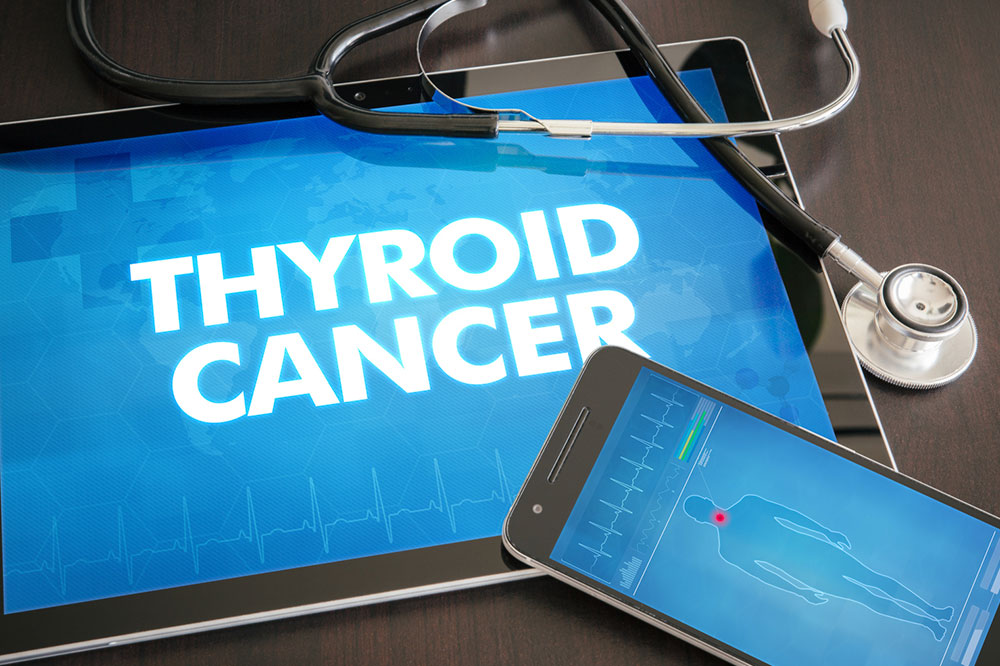Thyroid Cancer – Causes, Symptoms, Diagnostic Options, and More

Thyroid cancer is an abnormal mutation of cancer-causing cells in the thyroid gland that triggers the destruction of healthy cells in the gland. Women above a certain age are at a higher risk of developing this complication than men. While cancer can be diagnosed at a young age, advanced symptoms develop slowly and gradually, making it difficult for doctors to finalize a treatment plan. Here is an overview of the possible causes, known symptoms, and available treatments.
Causes and risk factors
Thyroid cancer risk increases due to exposure, inherent syndromes, or even certain nutritional deficiencies.
- Exposure to radiation
Any form of radiation therapy recommended for treating head cancer, neck cancer, or other underlying progressive disorders also increases exposure to radioactive elements. The healthy cells of the thyroid gland become malignant with repeated exposure. Even residing in areas with nuclear or radioactive fallouts while working in nuclear power plants may be a significant risk factor. - Underlying causes
Existing genetic mutations that result in endocrine diseases, a family history of thyroid disease, unusual gland enlargement, inflammation, and even an unhealthy increase in body mass index (BMI) affects the metabolism. Additionally, any imbalance in hormone levels increases the risk of the healthy cells becoming cancerous. - Nutritional deficiencies
Any hormonal imbalance triggered due to an iodine deficiency increases the risk of this cancer. It is a crucial element that the body must absorb to produce thyroid hormones. Thyroid hormones mainly help create proteins and enzymes for regulating metabolic functions. It is one of the reasons why iodine is added to salt so that daily supplemental intake is met for children and adults from foods and beverages. - Other known risk factors
Women have higher estrogen levels in the body; studies indicate this can be a potential risk factor. Also, papillary thyroid cancer, one of the known types, may develop among young adults between 30 and 50.
Symptoms
Thyroid cancer symptoms develop gradually over time and are often misdiagnosed due to overlapping health conditions.
- Unusually painful cough
A cough that is persistent and not triggered by any cold, flu, or viral infection can be a sign of developing thyroid cancer. However, with persistent coughing, one might also notice blood in the sputum or mucous, indicating serious cell damage. - Enlarged thyroid
Visible swelling in the lower neck where the gland is located could indicate enlargement of the thyroid as cancer continues to spread and mutate in the localized area. Once the cancer metastasizes, it can travel to other parts of the body. - Trouble swallowing
Swelling and inflammation of the gland can force the throat to close up and put pressure on the esophagus. As the cancer gradually develops, it can become exceedingly difficult to swallow daily foods due to the restricted esophageal cavity. - Trouble breathing
Pressure on the esophageal tract can also result in the constriction of the windpipe, further causing breathing problems. Experiencing difficult and restricted breathing without having any underlying respiratory disorder could indicate sudden inflammation of the airways in the neck region. - Changes in voice
The thyroid gland surrounds the voice box, which can put pressure on the vocal cord, resulting in abrupt changes in voice. One may notice hoarseness that develops slowly but persistently.
Diagnosis and treatment options
There are several ways doctors can confirm the presence of thyroid mutation.
- General physical exam
Thyroid cancer does exhibit a number of physical changes. So, doctors perform a physical exam to check for any new lumps, nodules, or inflammation of the gland by feeling the neck region. This is the first step among many diagnostic procedures. - Ultrasound and function tests
An ultrasound test uses an audio imaging technique that bounces sound waves off the thyroid gland to create an image. It helps point out the location and spread of the cancer-causing cells. In addition to ultrasound tests, blood is collected to check hormone levels and confirm any imbalance that could have triggered the cancer. - Imaging tests
Computed tomography (CT) scan, Magnetic Resource Imaging (MRI) scans, and Thyroid scan using an iodine marker can highlight the spread of the cancer. Oncologists suggest imaging tests should be done at periodic intervals to understand the progression of the disease. Based on this updated information, treatments can be modified. - Biopsy
A biopsy is done to identify the presence of cancer in tissue extracted from the suspected region. For thyroid cancer diagnosis, doctors suggest a fine needle or core biopsy to determine the type of thyroid cancer based on the tissue sample.
Treatment will vary depending on the type of cancer and the severity of its progression. Common options include:
Surgery
There are three types of surgery suggested including thyroidectomy, thyroid lobectomy, and lymph node dissection. In most cases, a thyroidectomy or thyroid lobectomy is performed to remove the thyroid gland partially or completely. In advanced cases, a lymph node dissection is recommended. It mainly prevents the cancer from spreading through the lymphatic system and affecting other vital organs.
- Alcohol ablation
Smaller thyroid cancers can be managed with alcohol ablation, where doctors inject concentrated ethanol substances into the infected cells to shrink the cancerous tumor. It might be done after surgical procedures to further remove infected cells or is generally suggested for people who are not fit for major surgery. - Thyroid hormone therapy
Hormone therapy is recommended to both replace and suppress certain hormones to maintain a balance necessary for metabolic functions. These hormones can be continued post-treatment to replenish daily requirements. - Radioactive iodine
This is an oral treatment option that is suggested for localized thyroid cancer where the radioactive iodine kills thyroid cells upon use. - Advanced stages treatment options
If the cancer has spread beyond the localized region, oncologists prescribe targeted therapy, radiation therapy, and chemotherapy. Alternatively, cryoablation (use of extreme cold to freeze and kill cancer cells) is also suggested to better manage cancer progression.






